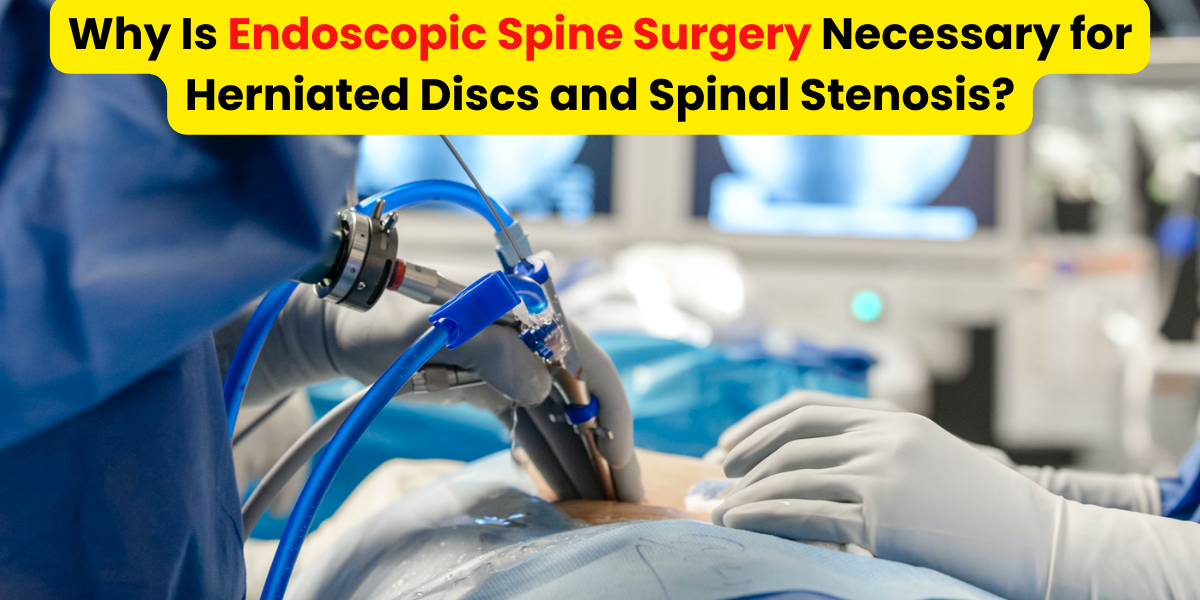Why Is Endoscopic Spine Surgery Necessary for Herniated Discs and Spinal Stenosis?
Endoscopic spine surgery is a modern technique used to treat herniated discs and spinal stenosis, which can cause severe pain and affect daily life. Unlike traditional spine surgery, which requires large cuts and long recovery times, endoscopic surgery uses small cuts and special tools to fix the problem areas in the spine. This method reduces damage to nearby tissues, lowers the risk of complications, and helps patients recover faster. Knowing why endoscopic spine surgery is important involves understanding its benefits, the conditions it treats, and how it can improve life for those with spinal problems.
What is Endoscopic Spine Surgery?
Endoscopic spine surgery is a minimally invasive procedure used to treat various spinal conditions, including herniated discs and spinal stenosis. Unlike traditional open spine surgery, it involves making small incisions and using a specialized camera and instruments to access and treat affected areas of the spine. Dr. Shrikant Dalal at Orthos Centre, a spine clinic in Pune, specializes in this advanced technique.
How is Endoscopic Spine Surgery Performed?
During endoscopic spine surgery, the surgeon makes a small incision and inserts a narrow tube with a camera and specialized instruments into the affected area of the spine. The camera provides a clear view of the spine, allowing the surgeon to perform the necessary procedures with precision. This minimally invasive approach typically results in less damage to surrounding tissues and muscles compared to traditional open surgery.
Benefits of Endoscopic Spine Surgery:
Smaller incisions and reduced tissue damage
Faster recovery time
Reduced risk of complications
Less postoperative pain
Minimal scarring
Outpatient procedures in many cases
Risks of Endoscopic Spine Surgery:
While endoscopic spine surgery offers many benefits, it is important to be aware of potential risks, which may include infection, nerve damage, blood clots, and anesthesia-related complications. However, these risks are generally lower compared to traditional open spine surgery.
What Conditions Does Endoscopic Spine Surgery Treat?
Endoscopic spine surgery can effectively treat a range of spinal conditions, including herniated discs, spinal stenosis, sciatica, spinal arthritis, spinal tumors, and some types of spinal deformities. The minimally invasive nature of the procedure makes it suitable for many patients who may not be candidates for traditional open surgery.
Endoscopic Spine Surgery Success Rate:
Studies have shown that endoscopic spine surgery can be highly effective in treating herniated discs and spinal stenosis, with success rates comparable to traditional open surgery. Patients typically experience improvement in symptoms such as back pain, leg pain, and numbness after undergoing endoscopic spine surgery.
Endoscopic Spine Surgery Side Effects:
Common side effects of endoscopic spine surgery may include temporary soreness at the incision site, mild discomfort, and bruising. However, serious complications are rare due to the minimally invasive nature of the procedure.
Endoscopic Spine Surgery Recovery Time:
One of the key advantages of endoscopic spine surgery is the shorter recovery time compared to traditional open surgery. Many patients are able to return to their normal activities within a few weeks, although individual recovery times may vary based on the specific procedure and the patient’s overall health.
Is endoscopic spine surgery safe?
When performed by an experienced surgeon, endoscopic spine surgery is considered a safe and effective treatment option for herniated discs and spinal stenosis. Dr. Shrikant Dalal at the Orthos Centre Spine Clinic in Pune has extensive experience and a track record of successful outcomes in this field.
Types of Endoscopic Spine Surgery
There are several types of endoscopic spine surgery, each tailored to address specific spinal conditions. Some common types include:
Endoscopic discectomy for herniated discs
Endoscopic foraminotomy for spinal stenosis
Endoscopic spinal fusion
Endoscopic decompression for spinal arthritis
Endoscopic spine surgery is a modern and essential approach for addressing herniated discs and spinal stenosis. By making small incisions and using specialized tools, this method reduces tissue damage, lowers the risk of complications, and shortens recovery time compared to traditional open surgery. It effectively treats various spinal conditions, enabling patients to resume their daily activities more quickly and improving their quality of life. Despite some potential risks, the high success rates and minimal side effects make endoscopic spine surgery a safe and effective option for many individuals with spinal problems. At Orthos Centre, we provide endoscopic spine surgery in pune for herniated discs and spinal stenosis.


